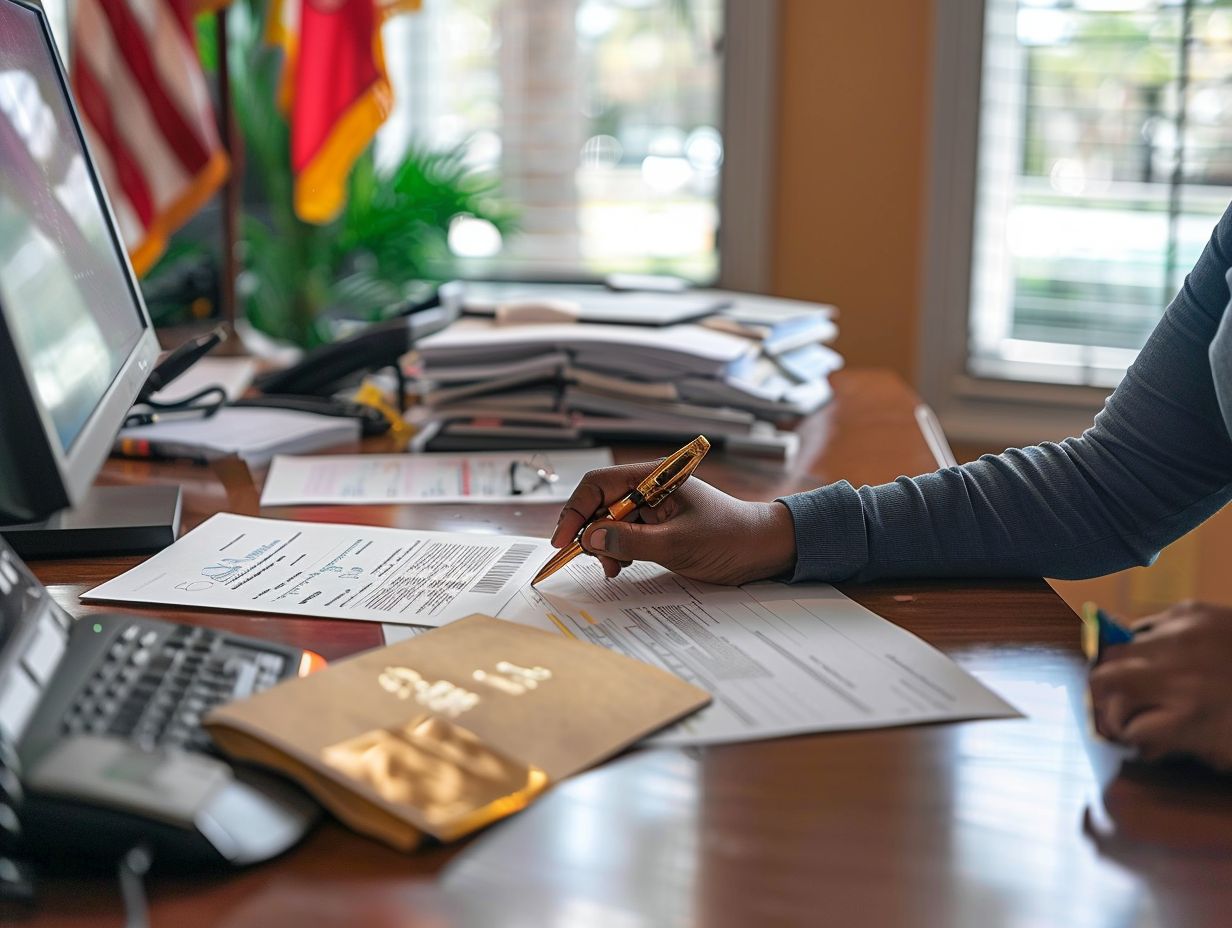Considering filing a trademark in Florida but unsure of the process and requirements involved? This comprehensive article will guide you through everything you need to know about trademarks in the Sunshine State.
From the benefits of registering a trademark to the steps involved in the filing process, we will cover it all. Learn about the costs, timeline, and requirements for obtaining a trademark in Florida. Let’s get started!
Key Takeaways:
- Registering a trademark in Florida provides legal protection for your brand and allows you to enforce your rights if someone infringes on your mark.
- Filing a trademark in Florida involves conducting a search, determining the appropriate filing basis, and preparing and filing the application.
- The process of filing a trademark in Florida can take several months and costs include government filing fees and attorney fees.
Why File a Trademark in Florida?
Filing a trademark in Florida offers businesses important legal protections and helps establish exclusive rights over regional names and logos, ensuring the protection of their brand identity within the state.
What are the Benefits of Registering a Trademark in Florida?
Registering a trademark in Florida provides several advantages, including regional legal protections, exclusive rights to the use of the mark within the state, and increased brand security for businesses operating locally.
State trademark registration is essential for safeguarding a company’s unique identifiers, such as logos, slogans, and product names, from potential infringement. By obtaining a state-level trademark, businesses like local breweries, boutique shops, and restaurants can establish a strong presence in the market while discouraging competitors from using similar marks.
For instance, a small family-owned winery in Florida can safeguard its brand image and reputation by registering its trademark with the state. This ensures that its wine labels and logos remain exclusive to its business and cannot be replicated by others.
What are the Steps to File a Trademark in Florida?
The process of filing a trademark in Florida consists of several steps, including:
- Conducting a trademark search
- Determining the suitable filing basis
- Preparing and submitting the application
- Addressing any office actions
- Ultimately receiving the registration certificate
Step 1: Conduct a Trademark Search
The initial step in submitting a trademark in Florida is to perform a thorough trademark search to confirm that the desired name or logo is not already in use or registered by another entity.
A comprehensive trademark search is important to avoid potential legal issues and infringement disputes. By using the trademark database provided by the United States Patent and Trademark Office, individuals can cross-check and verify the availability of their desired mark.
Navigating through the database can be complicated for those unfamiliar with trademark law. This is where the expertise of a trademark attorney becomes valuable. A knowledgeable attorney can assist in the search process, interpret search results, and provide insights on the risks of moving forward with a specific mark.
Failure to conduct a proper search can lead to expensive legal battles, rejection of your trademark application, and the need for rebranding efforts.
Step 2: Determine the Appropriate Filing Basis
Determining the appropriate filing basis is essential for a trademark application, involving the decision of whether to file based on ‘use in commerce‘ or ‘intent to use‘.
Each filing basis comes with its own requirements and implications. When filing based on ‘use in commerce,’ the assertion is that the mark is already in use in connection with the goods or services listed in the application. This necessitates submitting a specimen demonstrating the mark as used in commerce, like a label or packaging with the mark displayed.
Conversely, with the ‘intent to use’ basis, there is a claim of a genuine intention to use the mark in the future. This basis allows for the reservation of rights to the mark before actual use in commerce. For instance, if there is a product in the development stage and plans to launch it soon, filing under the ‘intent to use’ basis would be appropriate.
It is crucial to consider the current business situation and future plans when selecting the filing basis, as it can impact the overall success of the trademark application.
Step 3: Prepare and File the Application
The process of preparing and filing a trademark application includes filling out the required paperwork and ensuring that all necessary information is accurate and complete.
Accuracy is essential in this process, as mistakes or omissions can result in delays or even the rejection of the application. Common errors to avoid include providing incomplete information, failing to conduct a comprehensive trademark search to confirm the uniqueness of the chosen mark, and incorrectly classifying goods or services.
If there are uncertainties about any part of the application, seeking advice from a trademark attorney can assist in navigating the complex process and improving the chances of a successful application.
Step 4: Review and Respond to Office Actions
Following the submission of a trademark application, individuals may receive office actions from the Florida Department of State that necessitate their review and response.
These office actions can take different forms, such as requests for additional information, clarifications, or objections to the proposed trademark. It is important to thoroughly read and comprehend the office action to discern the necessary steps for a proper response. Timely and accurate replies play a critical role in addressing any concerns raised by the department and advancing the trademark registration process.
In such instances, the guidance of a trademark attorney can be highly beneficial in navigating the intricacies of trademark law and helping with the creation of a comprehensive and effective response.
Step 5: Receive Registration Certificate
Upon successful review and approval of the application, the individual will receive a registration certificate, officially granting exclusive rights to the trademark within Florida.
The registration certificate is a vital document that offers legal protection to the trademark, safeguarding it against unauthorized use by others. It serves as concrete evidence of ownership and assists in enforcement actions in case of trademark rights infringement.
To uphold these rights, it is crucial to regularly monitor the market for possible infringements and take prompt action when needed. Enforcement of trademark rights guarantees the preservation of the brand’s reputation and enables consumers to confidently recognize the products or services.
How Long Does it Take to File a Trademark in Florida?
The timeline for filing a trademark in Florida is typically around six weeks from application submission to receiving the registration certificate, depending on the complexity and accuracy of the application.
Various factors can impact the timeline of trademark registration in Florida. One critical factor is the issuance of office actions, which may necessitate clarification or amendment of the application, thus prolonging the process.
The thoroughness of the initial application significantly influences expediting or delaying the registration process. Timely responses to any inquiries or requests from the trademark office are crucial to prevent unnecessary delays. Seeking guidance from a qualified trademark attorney can also assist in navigating potential obstacles and expediting the overall process.
What are the Costs of Filing a Trademark in Florida?
The process of filing a trademark in Florida includes various costs, such as government filing fees and potential attorney fees, which may differ depending on the application’s complexity and the level of legal support needed.
What are the Government Filing Fees?
The government filing fees for trademark registration in Florida are determined by the Florida Department of State and the United States Patent and Trademark Office (USPTO).
These fees are crucial components of the trademark application process, covering various aspects such as filing the application itself, conducting a search to ensure the chosen mark is distinctive, and examining the application for compliance with legal requirements.
The fees are typically calculated based on the number of classes the mark falls under, with additional charges for certain actions like responding to office actions or filing statements of use. It’s important to budget not only for these filing fees but also for any potential additional costs that may arise during the application process, such as hiring legal assistance or paying for renewal fees in the future.
What are the Attorney Fees?
The fees for filing a trademark can vary depending on the complexity of the case and the expertise of the trademark attorney handling the application.
In general, the cost range for securing trademark services can be anywhere from a few hundred to several thousand dollars. These fees typically cover tasks such as conducting a comprehensive trademark search, preparing and filing the trademark application, responding to office actions, and monitoring the registration process.
Hiring an experienced intellectual property attorney, like those at Cueto Law Group or Saltiel Law Group, can provide numerous benefits including ensuring that your trademark is properly protected, navigating any potential legal obstacles, and maximizing the value of your intellectual property assets.
What are the Requirements for a Trademark in Florida?
For successfully register a trademark in Florida, the mark must meet specific requirements, such as distinctiveness and non-deceptiveness, to be eligible for legal protections and exclusive rights.
What is the Definition of a Trademark in Florida?
In Florida, a trademark is defined as any distinctive word, name, symbol, or device used by a business to identify and distinguish its goods or services from those of others.
Trademarks can come in various forms, including logos, slogans, product packaging, and even distinctive sounds or colors. For instance, the Nike ‘swoosh’ logo, the McDonald’s ‘Golden Arches,’ and the Intel jingle are all examples of trademarks. These unique identifiers help consumers recognize and associate products or services with a particular brand.
Florida Trademark laws provide the legal framework that governs the registration, enforcement, and protection of trademarks within the state, ensuring that businesses can safeguard their intellectual property rights.
What Types of Marks are Eligible for Registration in Florida?
Marks eligible for registration in Florida include names, logos, symbols, and other devices used to identify and distinguish a business’s goods or services.
Distinctiveness plays a crucial role in determining a mark’s registration eligibility. Marks categorized as arbitrary or fanciful, such as invented words or uniquely crafted symbols, often have a higher likelihood of approval. On the other hand, generic terms that simply describe the product or service generally do not qualify for registration.
For instance, a brand name like ‘Exxon‘ is distinctive and meets the criteria for registration, while a term like ‘Gas Station‘ would likely be considered too generic. It is important for businesses to select marks that differentiate them from others and can be legally protected.
What Cannot be Registered as a Trademark in Florida?
Certain marks are restricted from being registered as trademarks in Florida. These include marks that are deceptive, generic, or clash with existing common law trademarks.
Deceptive marks are ones that have the potential to mislead consumers about the nature, quality, or origin of goods or services. Generic terms that directly describe a product or service are ineligible for registration due to their lack of distinctiveness. Marks that closely resemble existing trademarks can create consumer confusion, which may lead to legal complications.
To steer clear of these issues, applicants should conduct a thorough search to ensure their mark is unique and does not infringe on existing trademarks. Seeking assistance from a trademark attorney can aid in navigating the registration process and improving the likelihood of successful registration.
Frequently Asked Questions
What is a trademark and why should I file one in Florida?
A trademark is a symbol, word, or phrase used to identify and distinguish a particular product or service. By filing a trademark in Florida, you protect your brand and prevent others from using it without your permission.
How do I know if my trademark is eligible for filing in Florida?
Your trademark must be unique and not already in use by another business in your industry. It should also be distinctive and not too similar to existing trademarks. Conduct a thorough search before filing to ensure your trademark meets these criteria.
What is the process for filing a trademark in Florida?
The first step is to conduct a trademark search to ensure your proposed mark is available. Next, you must complete and submit a trademark application to the Florida Department of State. Once your application is received, it will be reviewed and either approved or rejected.
How long does it take to file a trademark in Florida?
The timeline for filing a trademark in Florida can vary, but it typically takes 6-8 months for a decision to be made on your application. It’s important to submit a complete and accurate application to avoid any delays or rejections.
What are the fees associated with filing a trademark in Florida?
The filing fees for a trademark in Florida can range from $50-$350, depending on the type of application and number of classes you are filing for. It’s important to factor in these costs when considering filing a trademark.
Can I file a trademark in Florida on my own?
While it is possible to file a trademark on your own, it’s recommended to seek the assistance of a trademark attorney. They can ensure your application is complete and increase your chances of approval. Additionally, they can help you navigate any legal issues that may arise during the process.



























Rate this article:
No Comments yet!